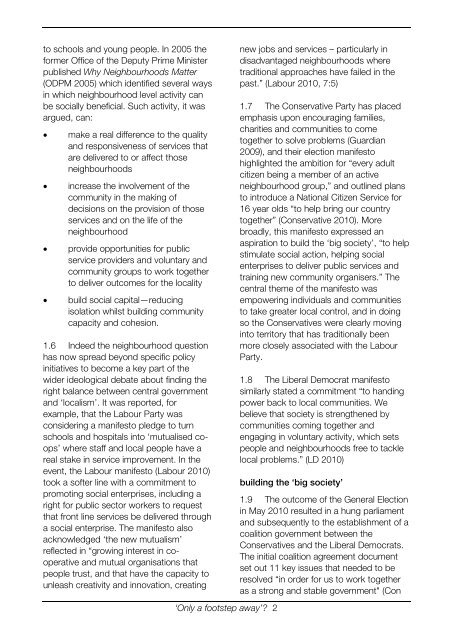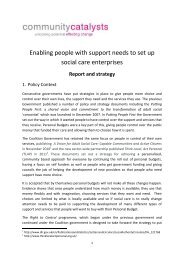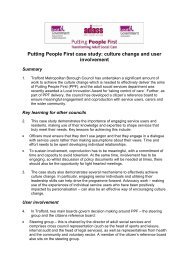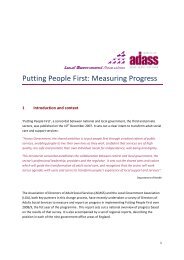'Only a footstep away' - Skills for Care - Think Local Act Personal
'Only a footstep away' - Skills for Care - Think Local Act Personal
'Only a footstep away' - Skills for Care - Think Local Act Personal
- No tags were found...
Create successful ePaper yourself
Turn your PDF publications into a flip-book with our unique Google optimized e-Paper software.
to schools and young people. In 2005 the<strong>for</strong>mer Office of the Deputy Prime Ministerpublished Why Neighbourhoods Matter(ODPM 2005) which identified several waysin which neighbourhood level activity canbe socially beneficial. Such activity, it wasargued, can:• make a real difference to the qualityand responsiveness of services thatare delivered to or affect thoseneighbourhoods• increase the involvement of thecommunity in the making ofdecisions on the provision of thoseservices and on the life of theneighbourhood• provide opportunities <strong>for</strong> publicservice providers and voluntary andcommunity groups to work togetherto deliver outcomes <strong>for</strong> the locality• build social capital—reducingisolation whilst building communitycapacity and cohesion.1.6 Indeed the neighbourhood questionhas now spread beyond specific policyinitiatives to become a key part of thewider ideological debate about finding theright balance between central governmentand ‘localism’. It was reported, <strong>for</strong>example, that the Labour Party wasconsidering a manifesto pledge to turnschools and hospitals into ‘mutualised coops’where staff and local people have areal stake in service improvement. In theevent, the Labour manifesto (Labour 2010)took a softer line with a commitment topromoting social enterprises, including aright <strong>for</strong> public sector workers to requestthat front line services be delivered througha social enterprise. The manifesto alsoacknowledged ‘the new mutualism’reflected in “growing interest in cooperativeand mutual organisations thatpeople trust, and that have the capacity tounleash creativity and innovation, creating‘Only a <strong>footstep</strong> away’? 2new jobs and services – particularly indisadvantaged neighbourhoods wheretraditional approaches have failed in thepast.” (Labour 2010, 7:5)1.7 The Conservative Party has placedemphasis upon encouraging families,charities and communities to cometogether to solve problems (Guardian2009), and their election manifestohighlighted the ambition <strong>for</strong> “every adultcitizen being a member of an activeneighbourhood group,” and outlined plansto introduce a National Citizen Service <strong>for</strong>16 year olds “to help bring our countrytogether” (Conservative 2010). Morebroadly, this manifesto expressed anaspiration to build the ‘big society’, “to helpstimulate social action, helping socialenterprises to deliver public services andtraining new community organisers.” Thecentral theme of the manifesto wasempowering individuals and communitiesto take greater local control, and in doingso the Conservatives were clearly movinginto territory that has traditionally beenmore closely associated with the LabourParty.1.8 The Liberal Democrat manifestosimilarly stated a commitment “to handingpower back to local communities. Webelieve that society is strengthened bycommunities coming together andengaging in voluntary activity, which setspeople and neighbourhoods free to tacklelocal problems.” (LD 2010)building the ‘big society’1.9 The outcome of the General Electionin May 2010 resulted in a hung parliamentand subsequently to the establishment of acoalition government between theConservatives and the Liberal Democrats.The initial coalition agreement documentset out 11 key issues that needed to beresolved “in order <strong>for</strong> us to work togetheras a strong and stable government" (Con
















